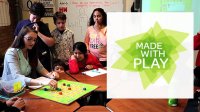Made With Play: Game-Based Learning Resources
Your content has been saved!
Go to My Saved Content.Intrigued by game-based learning, but not sure where to begin? Edutopia's series takes a look at game-like learning principles in action and commercial games in real classrooms -- and offers tips and tools for bringing them into your own practice. The Made With Play series is a co-production with Institute of Play; visit their website for many more resources around game-based learning for both educators and parents, including a comprehensive games and learning reading list (PDF).
These videos were made possible through generous support from the Carnegie Corporation of New York, the Bill and Melinda Gates Foundation, and the John D. and Catherine T. MacArthur Foundation.
Implementing Game-Like Learning Principles
Q Design Packs from Institute of Play, based on the tools and methods used by teachers, administrators, curriculum designers and game designers at Quest to Learn and CICS Chicago Quest, provide detailed infographics, worksheets, and rich media resources to support school design, curriculum design, and professional development. There are four Q Design Packs currently available for download:
- Q Curriculum Design Pack: A curriculum planning resource
- Q School Design Pack: A school design resource
- Q Games and Learning Design Pack: A game design resource
- Q Systems Thinking Design Pack: A systems thinking integration resource
Video Tutorials for Implementing Game-Based Learning in the Classroom
- "Rolling Out" a Game (2015)
- Managing In-Class Gameplay (2015)
- Using Games for Assessment (2015)
Videos of Game-Based Learning in Action
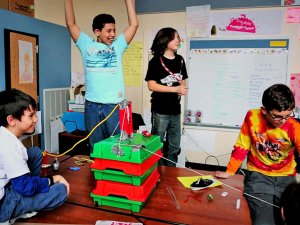
At New York City's game-based learning school Quest to Learn, sixth graders take risks in the process of designing a Rube Goldberg machine, which enables more creativity, innovation, and engagement.

Sixth graders learn math concepts in tandem with lessons about perseverance and stratching to achieve goals through a board game called Caterpillar. Download the Caterpillar game board (PDF) and game-play instructions (PDF) to use in your own classroom.
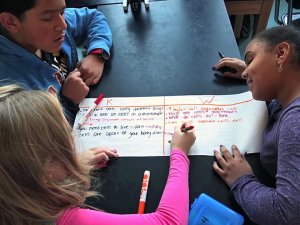
Learning how the body works becomes an adventure as sixth grade students embark on a biology-based narrative journey at game-based learning school Quest to Learn. Download the Dr. Smallz curriculum (PDF) to use in your own classroom.
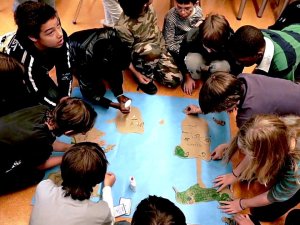
In a sixth grade classroom at Quest to Learn, ongoing feedback is embedded throughout the course of a collaborative geography game called Galactic Mappers. Download the Galactic Mappers Rules (PDF) and Game Cards (PDF) for use in your own classroom.
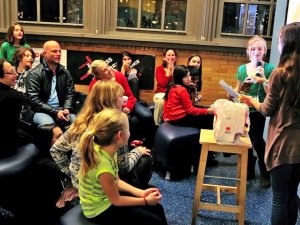
In a 7th-grade classroom, wellness lessons are framed as broader "missions" to get students engaged with relevant topics in their community. At the close of the project, they share what they've learned in TEDx-style talks. Design your own mission with the TEDx Mission Pack.
Using Commercial Games in the Classroom
- The Minecraft Cell: Biology Meets Game-Based Learning (2013)
Middle school students create their own 3D virtual worlds and learn lessons about communication, collaboration, and digital citizenship through the first-person sandbox-style game called Minecraft. Get tips for implementing Minecraft in the classroom.
Minecraft Resources on the Web
- Minecraft: Official website for the game
- Mojang: Persson's (developer of Minecraft) independent game studio
- The Minecraft Teacher: Joel Levin's blog about Minecraft and teaching
- MinecraftEdu: Educators and programmers working to make Minecraft accessible for schools
- MinecraftEdu Wiki: Tutorials, lessons, and resources
- Minecraft Teachers Google Group: Community to brainstorm, troubleshoot, and find inspiration
- Real-World Examples: Examples of Minecraft use in the classroom
- YouTube Videos Featuring MinecraftEdu : Tutorials, interviews, in-class footage, and more
- Pixel Pushers: A project to create a MinecraftEdu toolset for teachers
- Thesis on Collaborative Problem-Solving in Minecraft (PDF): a Masters degree project by Björn Berg Marklund
- Game-Based Learning Brings the History of Civilization to Life
Middle school students learn social studies through Historia, a paper-based simulation game that incorporates a world cultures curriculum aligned to state standards.
- "Designing a Classroom Game That Can Get Kids Excited About History," by Brian Waniewski: How social studies teachers Rick Brennan and Jason Darnell developed Historia to make history come alive for their middle-school students (from The Atlantic)
- Fostering Creativity and Community with a Platform Video Game
Opportunities for student collaboration, peer assessment, and rigorous design challenges abound in the puzzle video game LittleBigPlanet 2, where users are given the same toolset as the game's creators to build and share their own levels.
LittleBigPlanet Resources on the Web
- Little Big Planet.com: Official website for LittleBigPlanet
- Media Molecule: The game development company behind LittleBigPlanet 1 and 2
- Little Big Planet: The Road to 7 Million Levels (PDF): The General History of LBP
- LittleBigMap: An interactive map for over 10 million pieces of user-created content
- Media Molecule Podcast (MP3): A podcast about LBP design ideas
- Interview with Alex Evans : A video interview with Alex Evans, co-founder of Media Molecule
- LittleBigPlanet 2 Creation Tutorials and Games: Video and written tutorials about creation in LBP
- Learning Among LittleBigPlanet 2 Players: A post by researcher Matt Rafalow
- Connected Learning Among LittleBigPlanet 2 Players: A post by Matt Rafalow and Katie Salen
- Online Math Games Balance Challenge with Mastery Learning
Game designers at Mangahigh strive to find the perfect match between player skill and difficulty level in the standards-based teaching resources they build, and allow teachers to track student progress from within the games.
Mangahigh Resources on the Web
- Mangahigh: A games-based math teaching resource website
- Getting Started: Mangahigh's quick reference guide for teachers
- Prodigi Lessons (PDF): A list of all lessons available in Mangahigh's adaptive quiz engine
- Mathematics Game-Based Learning: Quick Start Guide (PDF): Mangahigh's brief guide for getting your class started, setting up challenges, and monitoring analytics
- Reinventing the Science Fair With Portal 2 Puzzle Maker
STEM teacher Don LaBonte used the Portal 2 Puzzle Maker to engage his students in demonstrating math and science problems through game design. The Puzzle Maker is a powerful toolset that allows students to produce their own content from within Portal's game world.
Portal Resources on the Web
- Portal 2 (from Valve): Official website for Portal 2 from the game development company, Valve
- Teach With Portals: Provides information and tools—including access to Valve games
- #G4C12: Valve and Teach with Portals : Valve introduces Teach With Portals at G4C12 festival
- Portal: Terminal Velocity : A fantastic fan-created video
- Gabe Newell Keynote : Valve Co-Founder and Managing Director speaks during the Games for Learning Day at the 8th Annual Games for Change Festival in New York City, on June 22nd.
Other Edutopia Resources on Game-Based Learning
- Game-Based Learning Blogs
See all blogs about game-based learning on Edutopia.
- Edutopia's Games for Learning Community Group
Join the discussion in Edutopia's community group on game-based learning and gamification of learning.
- Game-Based Learning: Resource Roundup
Check out Edutopia's collection of articles, videos, and resources on using video games, simulations, and gaming concepts in the classroom.
